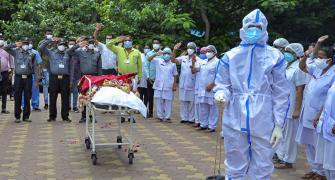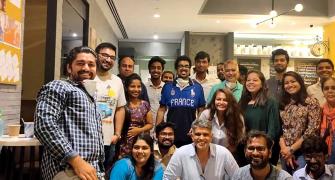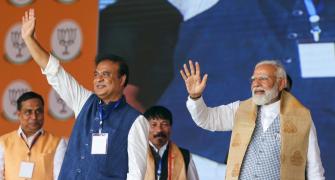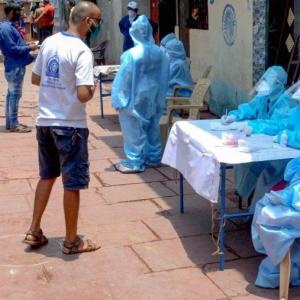'We are learning from every patient who is admitted, treated and discharged.'
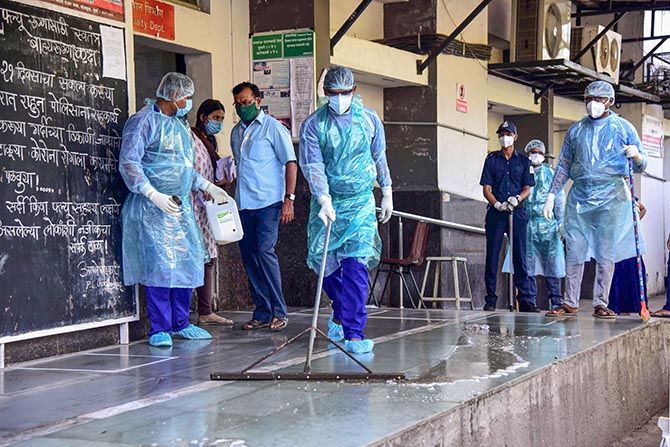
Maharashtra Health Minister Rajesh Tope explains to Prasanna D Zore/Rediff.com why the state is witnessing a rise in COVID-19 patients.
Why is the number of COVID-19 cases increasing in Maharashtra?
It is bound to happen when we open up the lockdown and people begin to move out.
Taking this into account, what people must do now is strictly follow the protocol issued by the state government to prevent the spread of coronavirus.
While the government will do whatever it needs to do stop the contagion, it is also up to the people to follow social distancing norms, hand hygiene discipline, wear face masks and ensure that they also follow these rules very diligently at the individual level.
One of the reasons why you are seeing a rise in COVID-19 cases is because the state government has asked all district health officials to undertake tracing aggressively.
From 15 for 1, we are now doing 20 for 1, which means if we were tracing and isolating 15 people who came into contact with one COVID positive patient, that number now has been increased to 20.
And the biggest challenge we are facing right now is to track and trace huge numbers.
To bring the spread under control, we are also ensuring that these people are properly isolated and then tested and treated.
While these measures have been undertaken on war-footing, the results will take time to become visible because of the huge scale that we are dealing with.
What extra measures is the state government undertaking to stem the number of rising cases?
We have aggressively increased the number of tracking, tracing and testing. This is being done on mission mode and we are continuously monitoring the situation.
Today (August 18), we are going to have a review of the situation with all of the collectors and commissioners in Maharashtra and come up with a new plan if need be.
Maharashtra Industries Minister Subhash Desai has raised concern about the number of rising cases in rural areas. What is the difference between the COVID-19 cases in rural and urban Maharashtra?
We have not observed any particular reason why the disease is spreading to rural areas now.
As many people moved from urban areas to their villages before and during the lockdown, there is definitely a rise in the number of COVID-19 patients in rural areas.
We are using the same formula in rural areas -- tracing, tracking, testing and treatment -- that helped us bring the number of patients under check in urban areas.
We have now all the necessary medical and health infrastructure in place in rural areas of the state.
All public health hospitals, rural hospitals, dedicated COVID health care centres are now equipped with the necessary equipment to deal with the rise in rural areas.
Tertiary health care equipment like ventilators and well-equipped ICUs are now available at district headquarters. Patients who require admission into ICUs are referred to district headquarters.
Isn't it a cause for concern that Maharashtra has now crossed 20,000 deaths of COVID-19 patients?
We agree this is a cause for concern. Our efforts are directed towards preventing deaths at any cost, but unfortunately people die mostly because of comorbidities.
The other crucial reason why the number of deaths is rising is because many people visit hospitals at the last moment.
These are the two major reasons which I can point out why the number of deaths is increasing.
What measures is the government taking to ensure that these patients don't reach the hospital only when they reach a critical stage?
We are ensuring that critical cases get detected early and that is the reason why we have gone aggressive on tracking, tracing, testing and treatment protocol so that those who are comorbid and critical could be detected quickly and provided with medical care that one gets at the ICUs.
We are taking measures to improve upon the effectiveness of these methods.
What has the government and you as the health minister, learned about controlling COVID-19? What is your biggest learning since the pandemic began?
This is a contagious disease and to handle it we have to make people aware.
Our success will rest on how effectively and quickly we communicate with the people about the importance of maintaining face and hand hygiene and social distancing.
It is also important to encourage people to visit the hospitals before the situation gets critical so that we can save precious lives.
Based on our learning and experience we have undertaken steps to educate people, make them aware about how to live with this virus.
People showing mild, moderate or advanced symptoms should be immediately rushed to the hospitals.
We have been successful in creating awareness among the people about regularly checking their oxygen levels.
They now know that if this level goes below 95-90 they have to immediately rush to the hospital and get admitted, more so for those having comorbidities.
Early detection helps doctors control it at an early stage.
If it gets derailed and if oxygen levels go below 85-80, then it becomes very difficult.
When patients come to hospitals at such stage they have to be provided ventilator support and at such last moments it becomes very, very, difficult for the doctors to manage the patients' health.
Out of the 20,000 or so deaths in Maharashtra related to COVID-19 is it the case that they reached the hospitals late and suffered from comorbidities?
Yes, hundred percent.
That is the major chunk, I would say, and I am saying so because every COVID-19 death is audited in Maharashtra.
There are reasons listed for every COVID-19 death, how we could have managed that particular patient in a better way so that we could have saved him is also a point that the doctors and audit committee mentions.
We are learning from every patient who is admitted, treated and discharged. We are also learning from every patient who dies.
Any other important findings from this audit that the Maharashtra government can undertake to reduce the number of casualties?
We are continuously giving the best orientation to health workers, motivating them about effective house-to-house surveys, finding comorbid patients, isolating patients and monitoring their health parameters regularly to find out if they are facing any difficulties or problems in breathing, and if so, get them immediately admitted.
There have been reports about non-availability of drugs like Remdesivir, which many doctors prescribe but are always in short supply or are not available to patients when they need it the most.
What measures is the government undertaking to bridge the gap between prescriptions and non-availability of Remdesivir?
There is some shortage, I would say, but compared to what the situation was last month or in June, we have taken several measures to bridge the gap.
The drug is now freely available, but in my personal opinion the numbers need to be increased manifold given the demand for the drug.
There is shortage of the drug because of the supply.
We have given orders to several companies; money is not an issue, orders are not an issue but the supply is not there.
Are you saying that the pharma companies are not manufacturing enough?
The supply is not there and we are trying to find out the reason.
It is not like that there is no availability at all in the hospitals. Every government hospital in the state has adequate Remdesivir.
While Tocilizumab is not that effective (in treatment of COVID-19) as we have been told by doctors, we are not relying more on that drug.
Remdesivir is available, but given the spike in the number of cases, I think the supply should increase to match the number of rising cases.
There is not a huge deficit of Remdesivir.
How long before the Serum Institute's vaccine becomes readily available?
We are in regular contact with the Poonawalas of Serum Institute. (Nationalist Congress Party President Sharad) Pawar saheb and I will be meeting them this week.
What we hear is they are working hard to get the vaccine out in the market at the earliest. I am very positive that we will have a vaccine out before the end of this year.
How is Sharad Pawar doing now?
He is doing absolutely fine. I spoke with him yesterday and there is no cause for concern at all.
Unfortunately, his PSOs (personal security officers) and some household staff have been infected and so we are following only precautionary protocols.
All the close and high-risk contacts (who came in contact with those who have been infected) have been tested yesterday and we will do whatever has to be done further depending upon their test results.
Pawar saheb is absolutely normal and in good health. There is no cause for concern at all. As some staff members tested positive, he has been isolated but very active.
Is there a dispute brewing in the Pawar family again given his statement against his nephew Parth Pawar?
The Pawars are an ideal family and they will stick together through thick and thin. It is not a big issue at all.
I have been in close contact with the family for long now and have seen that Pawar saheb has always been at the helm of the affairs in the family.
Everyone listens to him and he commands respect not only in his family, but across Maharashtra and India.

